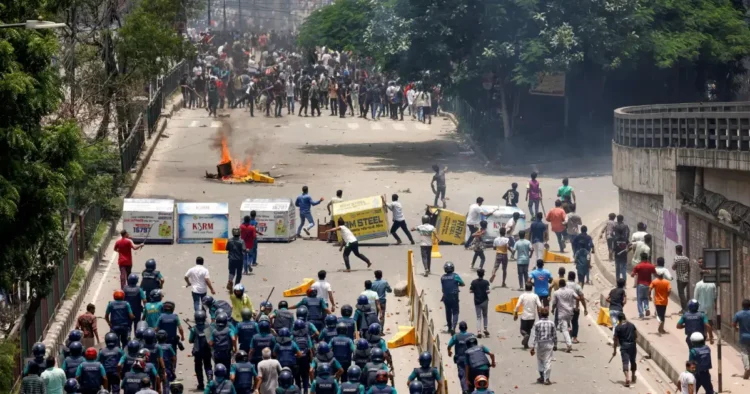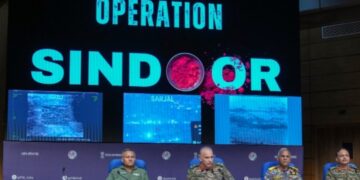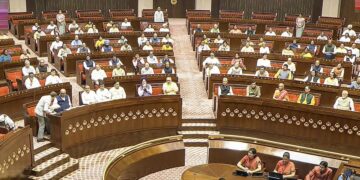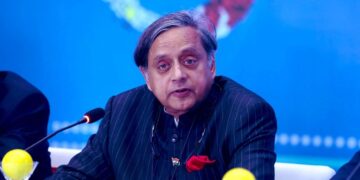Amid several reports of rioting in Bangladesh, a stark new chapter of violence has emerged following the forced resignation of five-time Prime Minister Sheikh Hasina on August 5. The recent upheaval has not only intensified political instability but has also seen disturbing acts of violence, including the tragic burning of a hotel, which highlights the severe consequences of such political turmoil.
In a distressing turn of events, a mob celebrating Hasina’s ouster set fire to a five-star hotel owned by Shahin Chakladar, a leader of Hasina’s party, the Awami League. Located in Jessore, the hotel blaze, which began around 4 pm, raged for over four hours before being brought under control. Despite the efforts of fire officials, the mob obstructed their rescue efforts, leading to a horrific death toll. At least 24 people lost their lives, most due to suffocation, with around 150 others hospitalized after being rescued by an Air Force helicopter.
https://twitter.com/MrSinha_/status/1820506861331796179?ref_src=twsrc%5Etfw%7Ctwcamp%5Etweetembed%7Ctwterm%5E1820506861331796179%7Ctwgr%5E237bee409923911b49a8d61c7f05a43422d23d49%7Ctwcon%5Es1_&ref_url=https%3A%2F%2Fritamdigital.com%2Fwp-admin%2Fpost.php%3Fpost%3D47940action%3Dedit
The fire also claimed the life of an Indonesian citizen, further underscoring the international impact of this unrest. The violence extended beyond the hotel, as anti-Hasina protesters, in what was described as a ‘victory march,’ attacked various symbols of the Awami League and key landmarks. Among the targeted sites were a mural of Bangabandhu Sheikh Mujibur Rahman, a sculpture of Sheikh Russel, and the district Awami League office.
Recent events in Bangladesh have provided a stark reminder of the dangers of foreign intervention in a nation’s democratic processes. On a day when Sheikh Hasina, the democratically elected Prime Minister of Bangladesh, was removed from power by what many are calling the American deep state forces, the consequences of such actions have become painfully clear. As we observe the chaos and unrest that has followed, it is crucial to reflect on the implications for India and the potential perils of similar interventions in our own democracy.
Intervention and Its Consequences
When Rahul Gandhi goes to London and urges Western powers to save Indian democracy, advocating for American intervention, one must ask: Is this the kind of intervention he is referring to? The current situation in Bangladesh serves as a vivid illustration of what happens when Western countries interfere in another nation’s democratic processes. The result is often chaos, instability, and a complete breakdown of law and order.
In Bangladesh, the intervention by external forces, prompted by internal factions such as the BNP and Jamaat-e-Islami, who sought foreign help after failing to win elections legitimately, has led to widespread violence and disorder. The country has been plunged into turmoil, with Islamist forces wreaking havoc and innocent lives being lost. This begs the question: Do we want this for India?
The Dangers of Foreign Influence
There are three critical points to consider in light of the Bangladesh crisis. First, the situation in Bangladesh is not unique to that country. It is a pattern that repeats itself whenever the American deep state intervenes in a nation’s democracy. Internal factions that lose elections often seek external help, leading to anarchy and violence. The BNP and Jamaat-e-Islami’s plea to America to help them defeat Sheikh Hasina has resulted in nothing but chaos.
Secondly, we must recognize that there are political parties and forces within India that desire similar chaos and anarchy. These groups, unable to gain power through legitimate means, might resort to inviting foreign intervention. Look at the situation in Bangladesh; this is what chaos and anarchy look like.
Do we want the Americans or the Chinese to do this in our country? Is it not imperative that political parties like Congress disclose their arrangements with foreign powers, such as the Chinese Communist Party?
Nationalism as the Safeguard
The only safeguard against such chaos is nationalism- a sense of putting the nation first. Sheikh Hasina was a nationalist leader who stood up to both China and America. Her removal has led to the loss of a leader who prioritized her nation over foreign interests. The Americans and Chinese did not favor her independent stance, and the consequences are now evident on the streets of Dhaka.
The American government, led by President Joe Biden, has called for allowing peaceful protests. However, the situation in Bangladesh is far from peaceful. People are being attacked, and leaders of various parties are being murdered. This is not a student protest; it is a radical Islamist uprising.
The so-called peaceful protesters in Bangladesh are nothing but hoodlums and Islamists who do not respect institutions. Similarly, the protests in India, like those at Shaheen Bagh, where roads were blocked, ambulances stopped, and violence erupted, did not respect institutions.
The Threat to Indian Democracy
Do we want such forces to take over our country? If we believe they never will, remember there is a political party in Bangladesh, like the BNP, which cannot win elections legitimately. They align with forces like Jamaat-e-Islami, aiming to alter the very character of Bangladeshi democracy. When these factions join hands with foreign entities, the result is catastrophic.
-ISKCON temple was attacked
-A Kali Temple was Attacked
-Hindu Councilors were KiIIedJust because a few pics/videos were unrelated, doesn't mean it didn't happen. ISIS toilet cleaner doing overtime to prove no such things are happening in #Bangladesh.pic.twitter.com/GTW3KDuQnV
— Mr Sinha (@MrSinha_) August 6, 2024
In the end, we must learn from the events in Bangladesh. Those who wish for Western powers to intervene in India should reconsider. Look at the situation in Bangladesh and ask yourself if this is what you want for our country.
Let us stand firm in our nationalism, put our nation first, and reject any foreign intervention that threatens our democracy.

















Comments